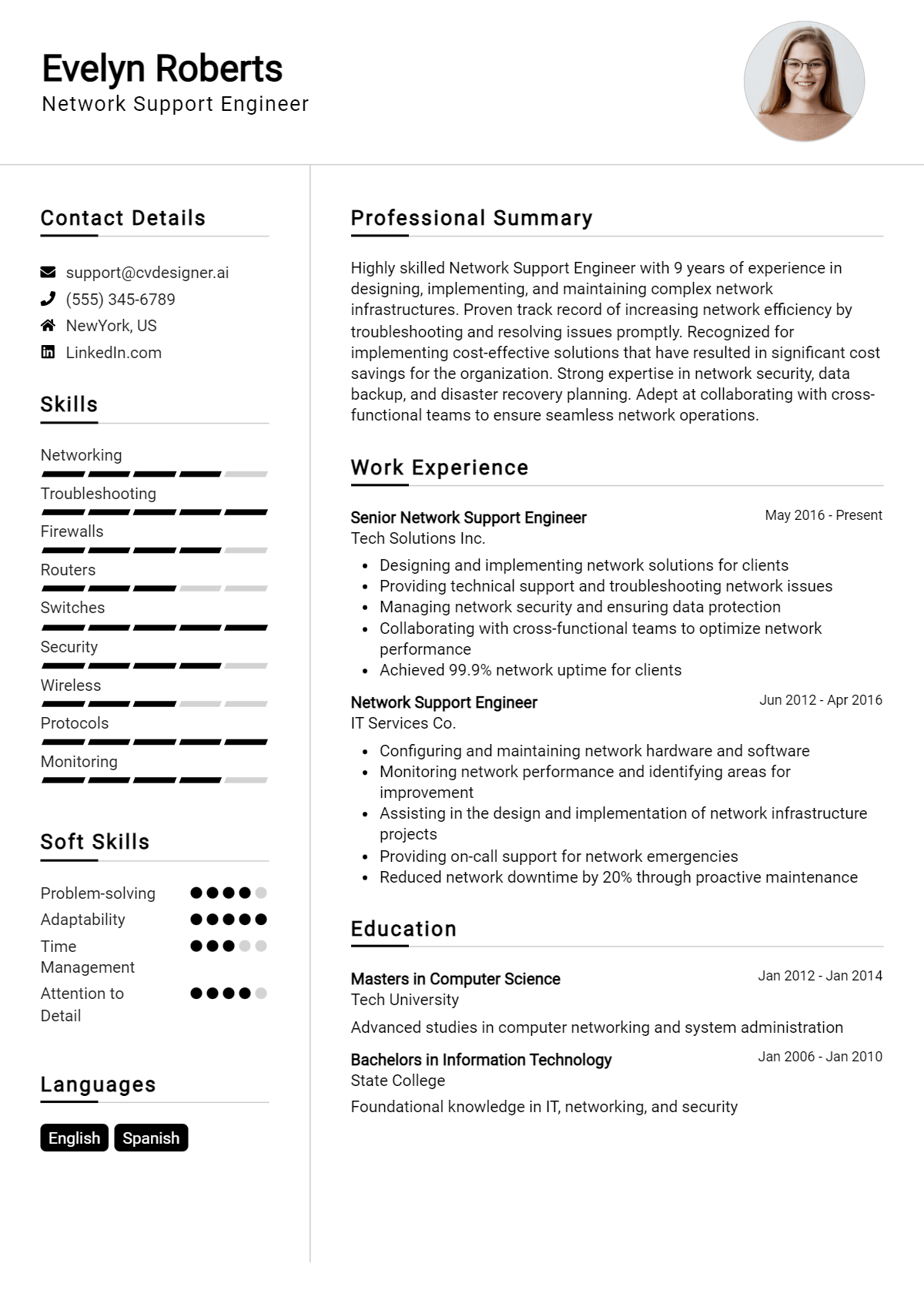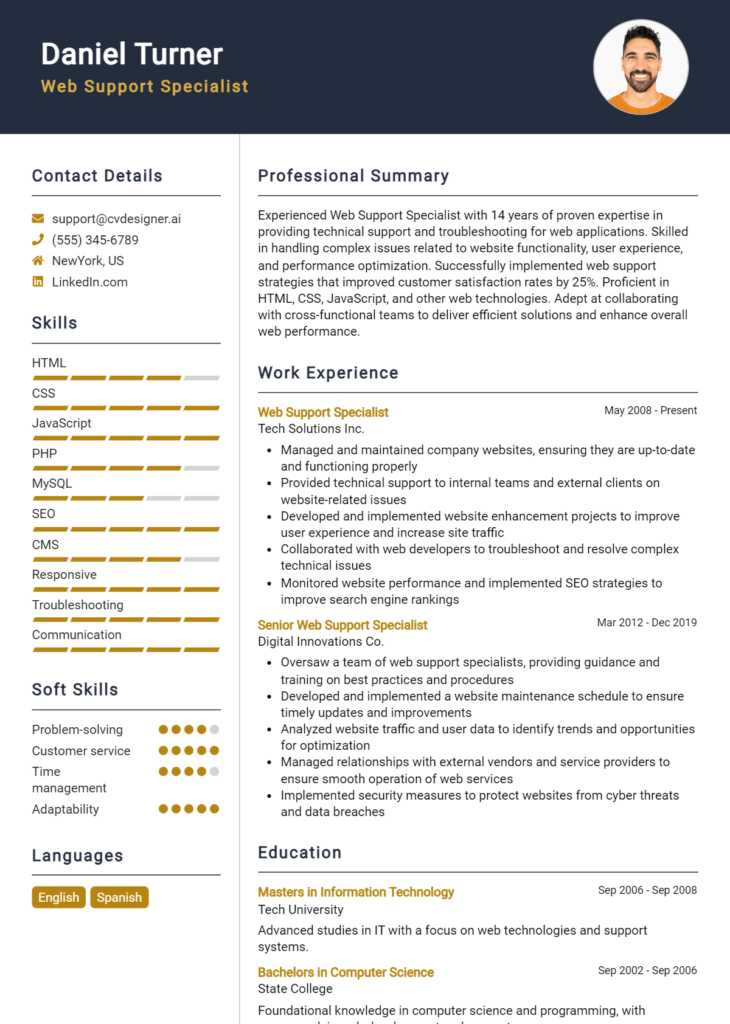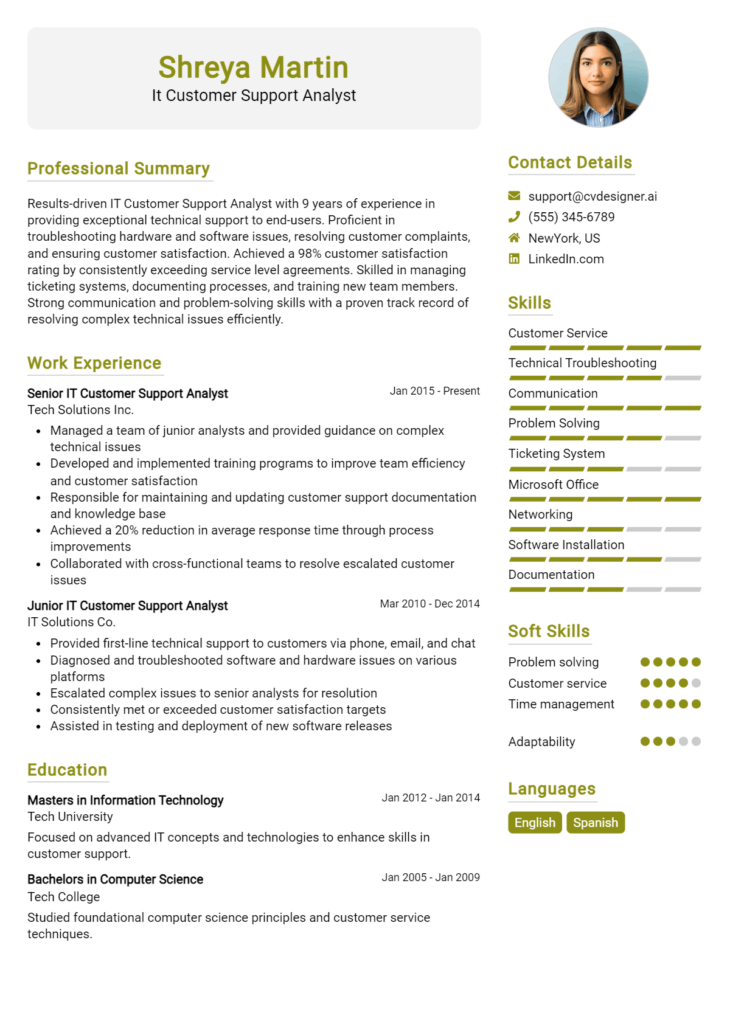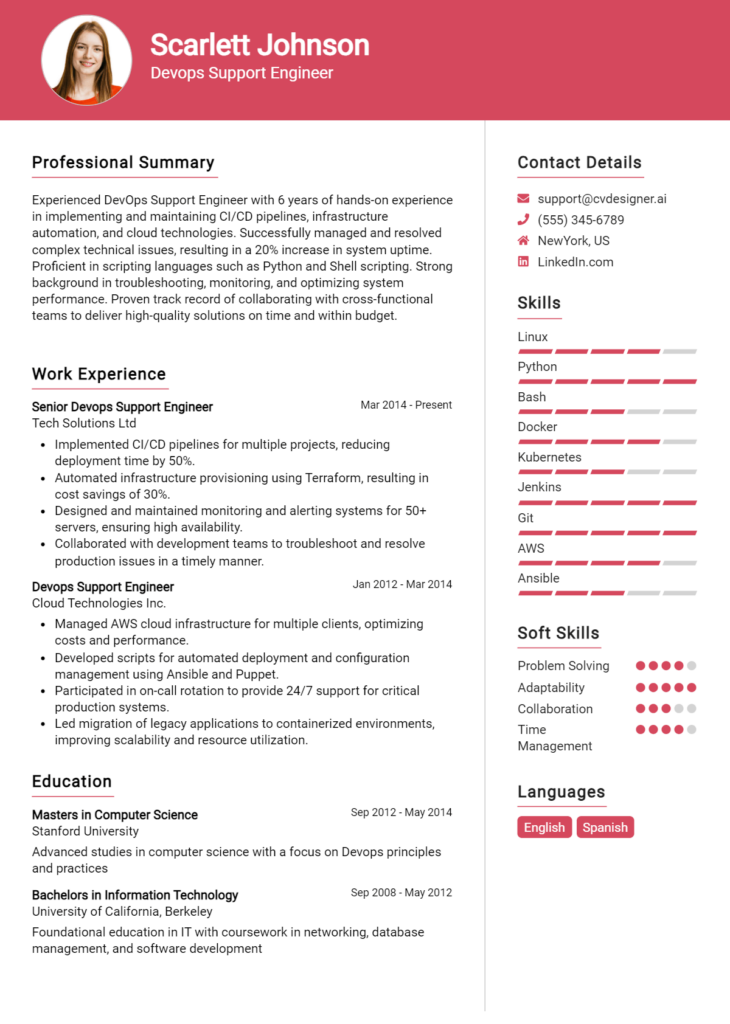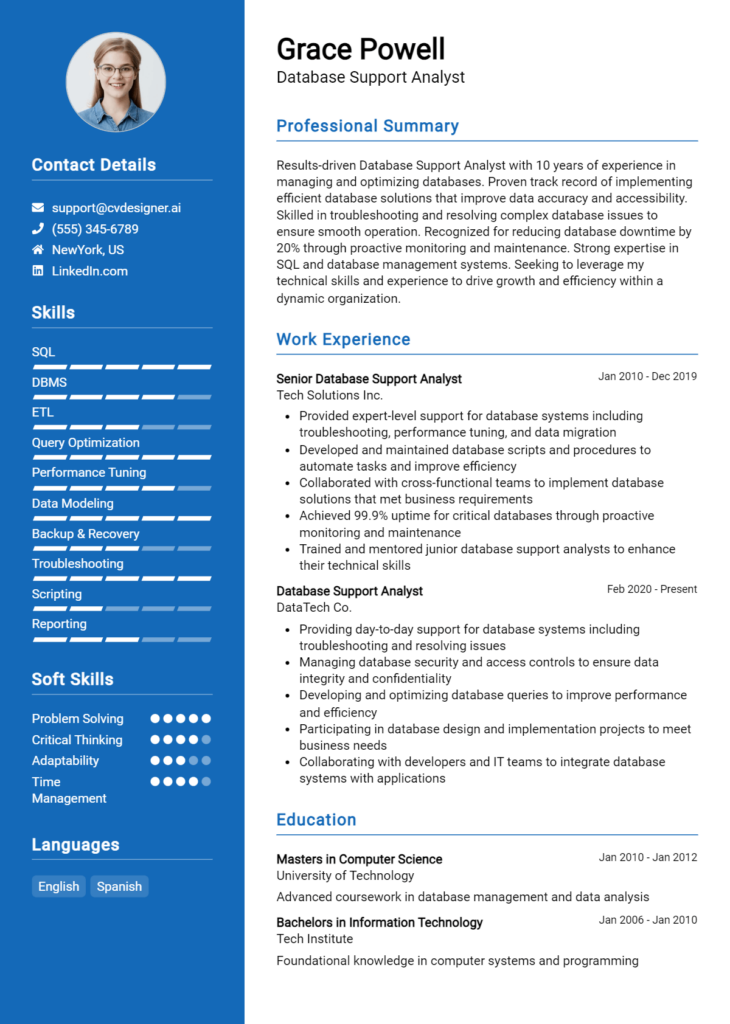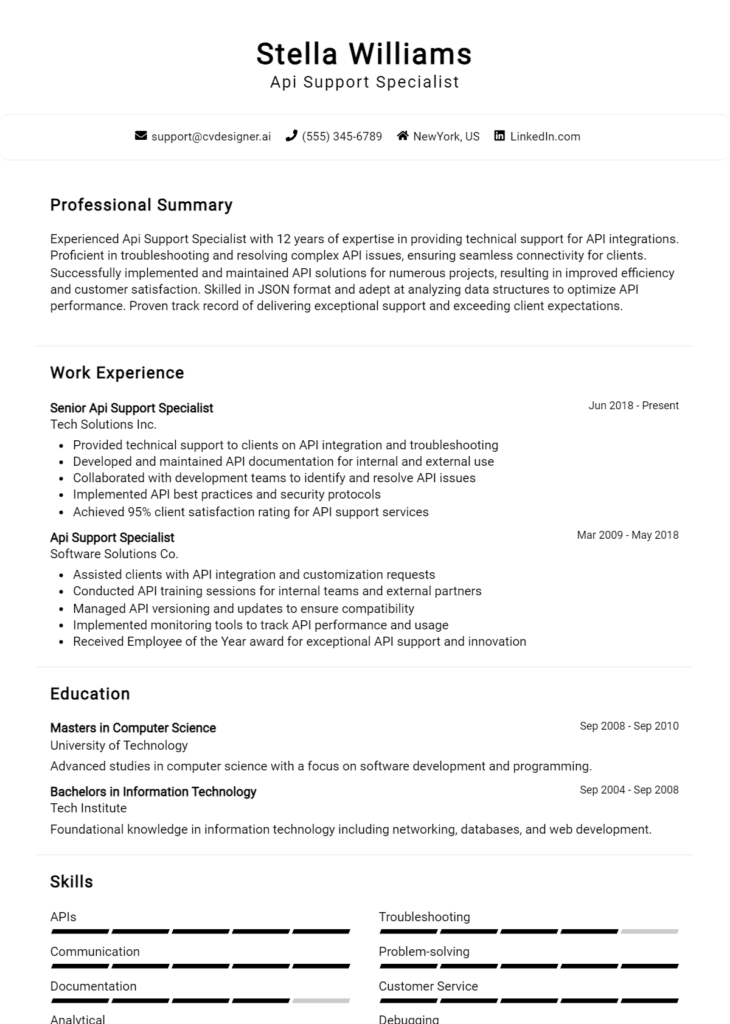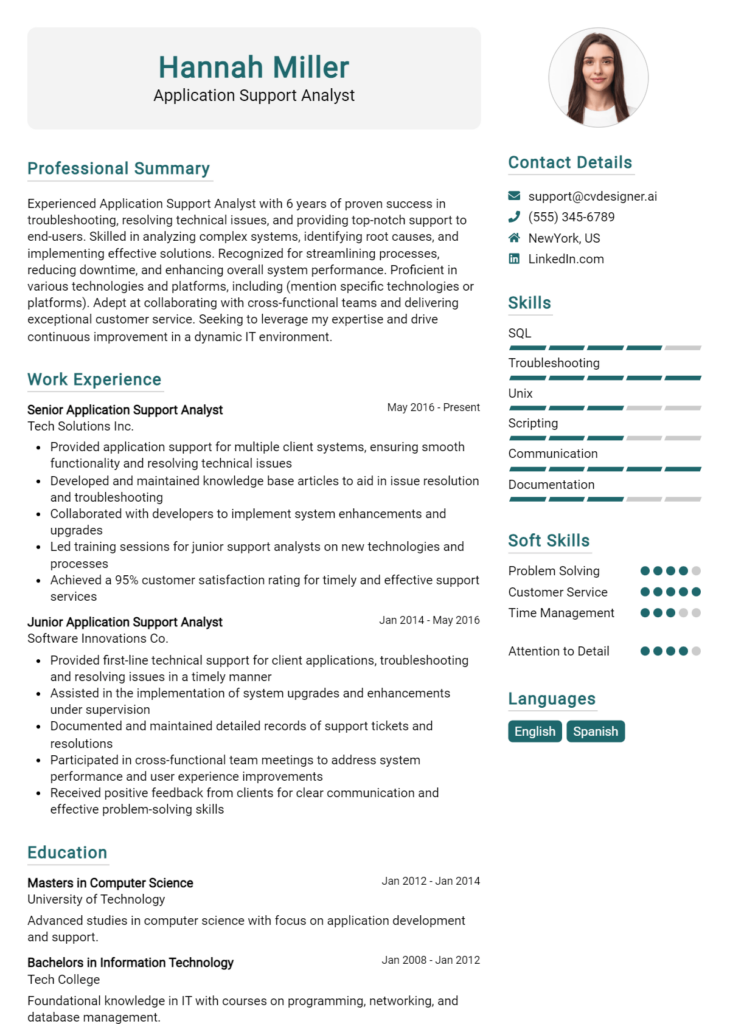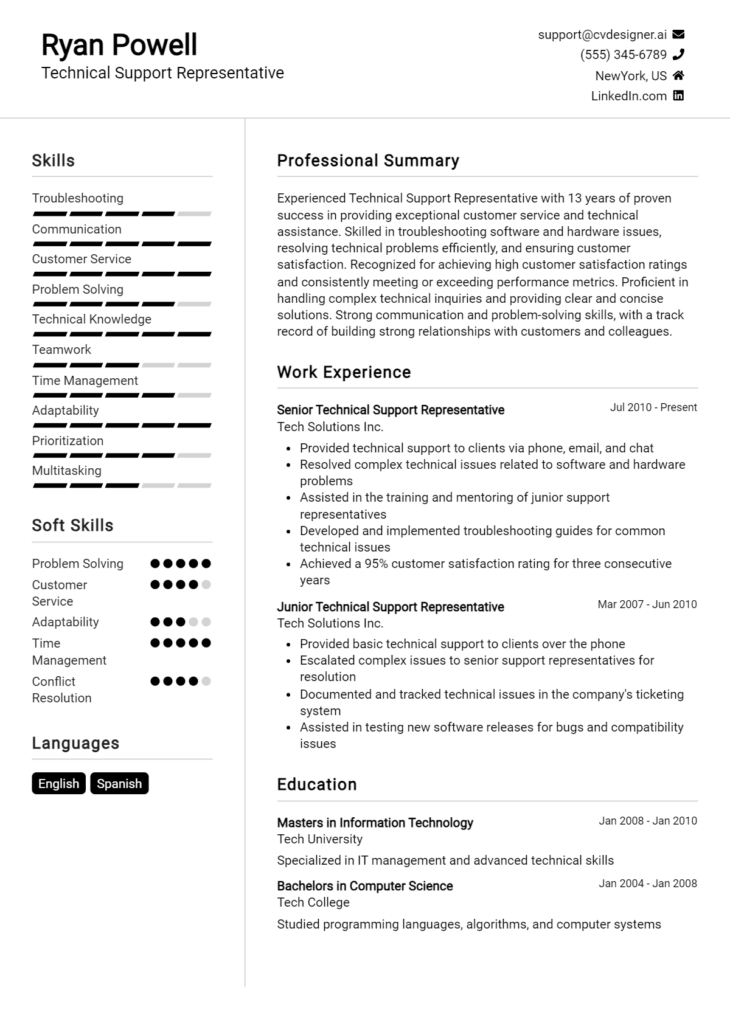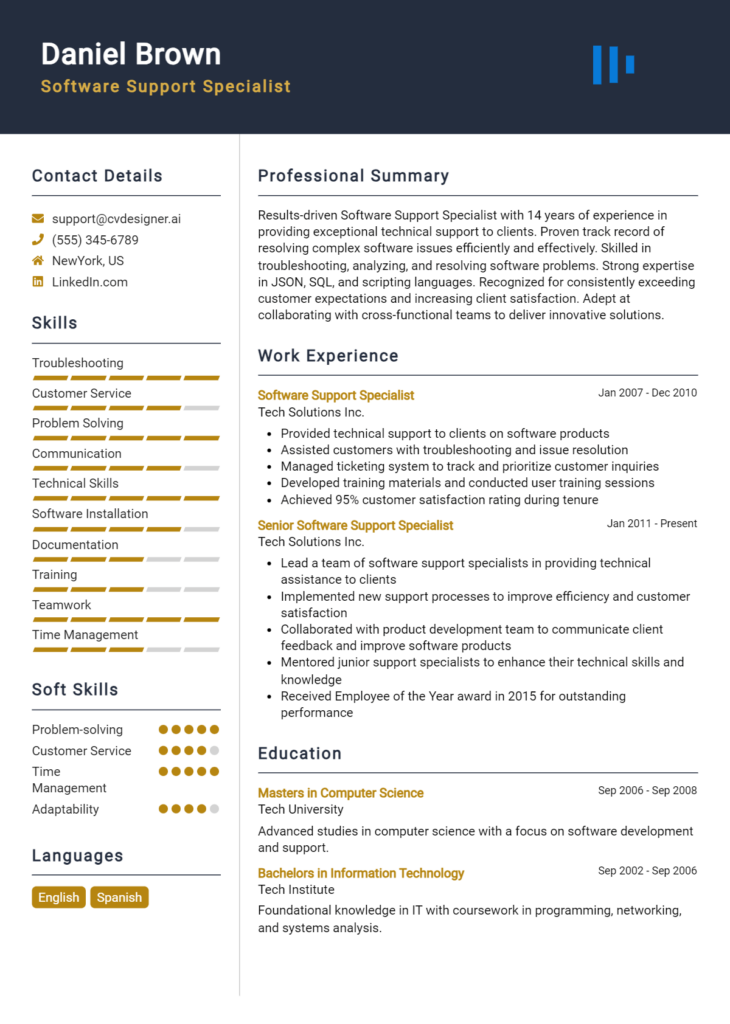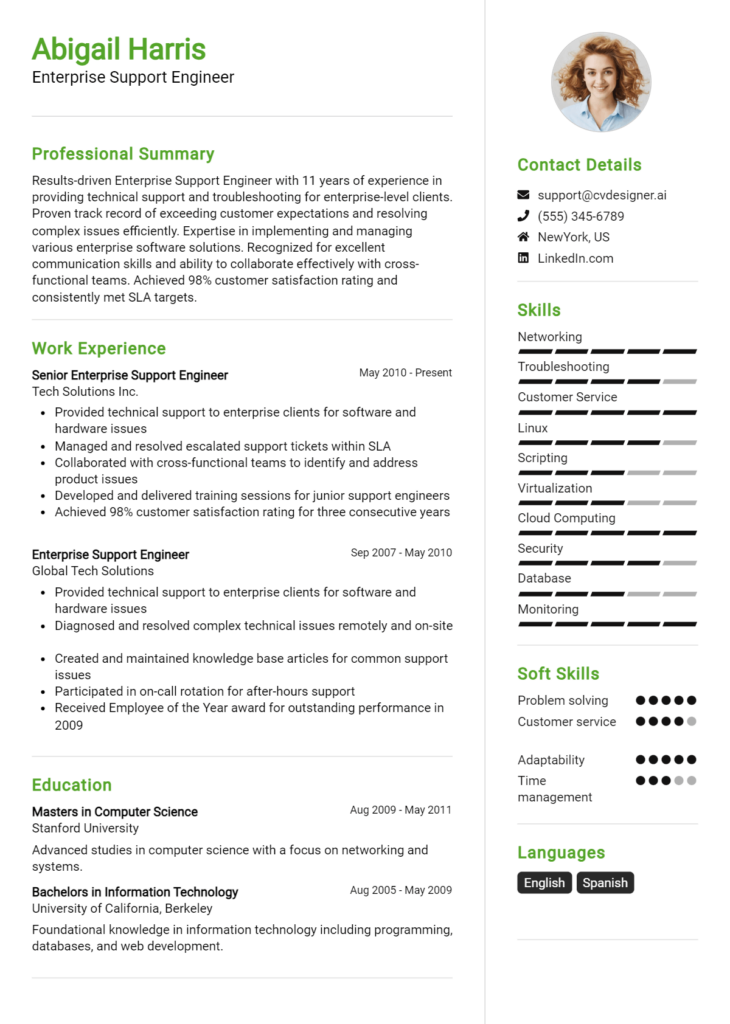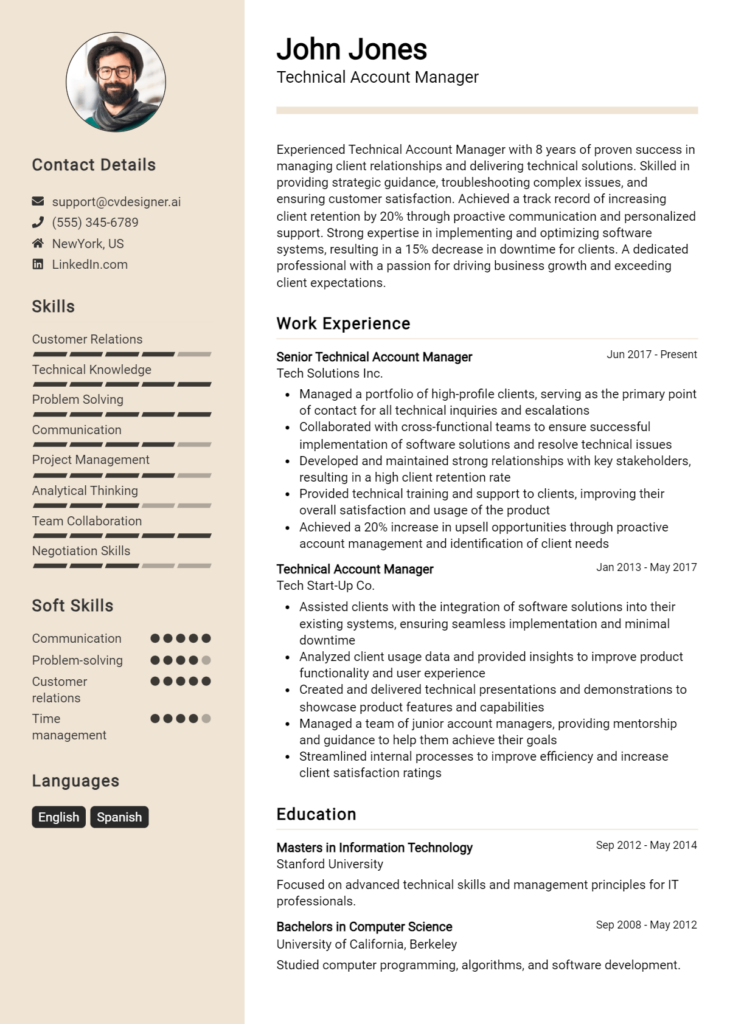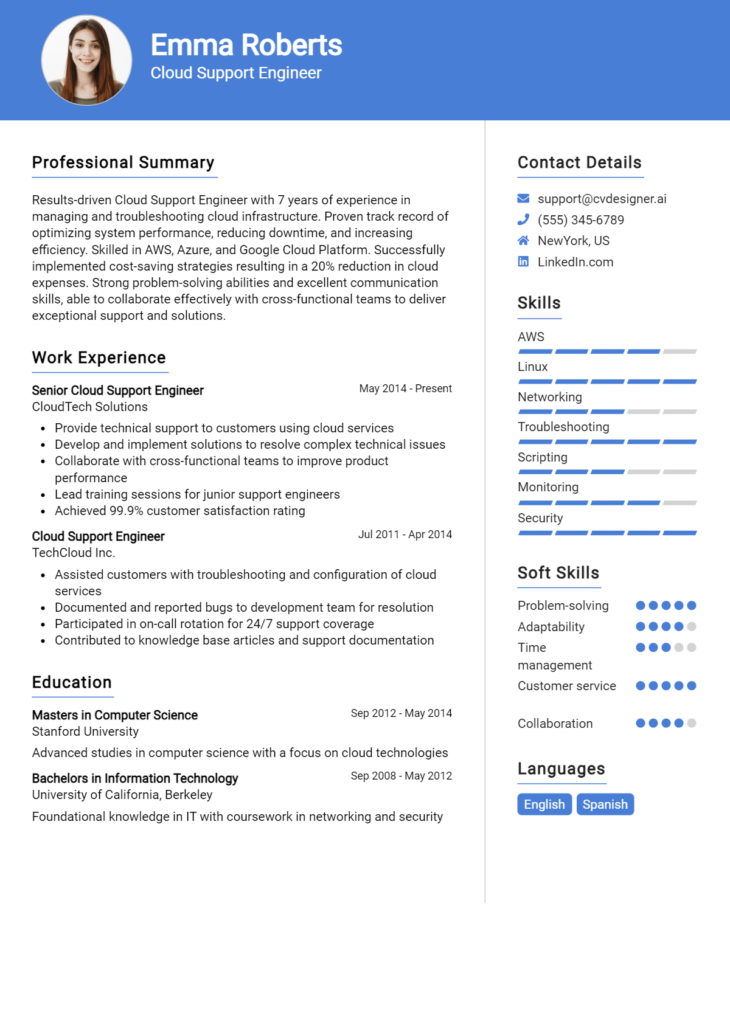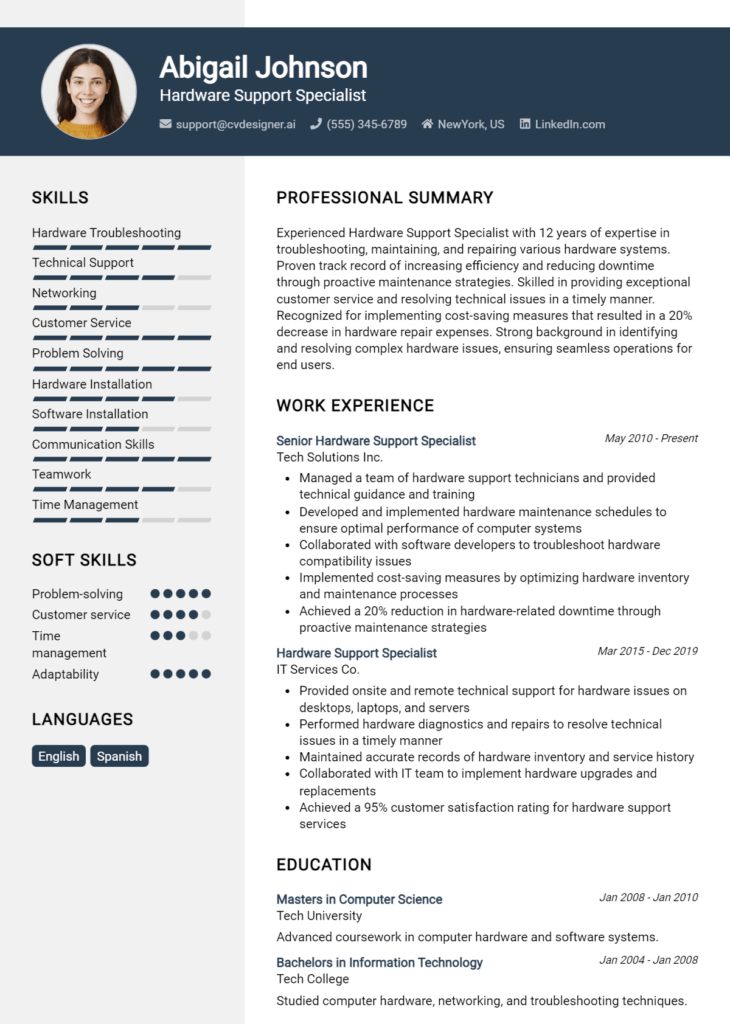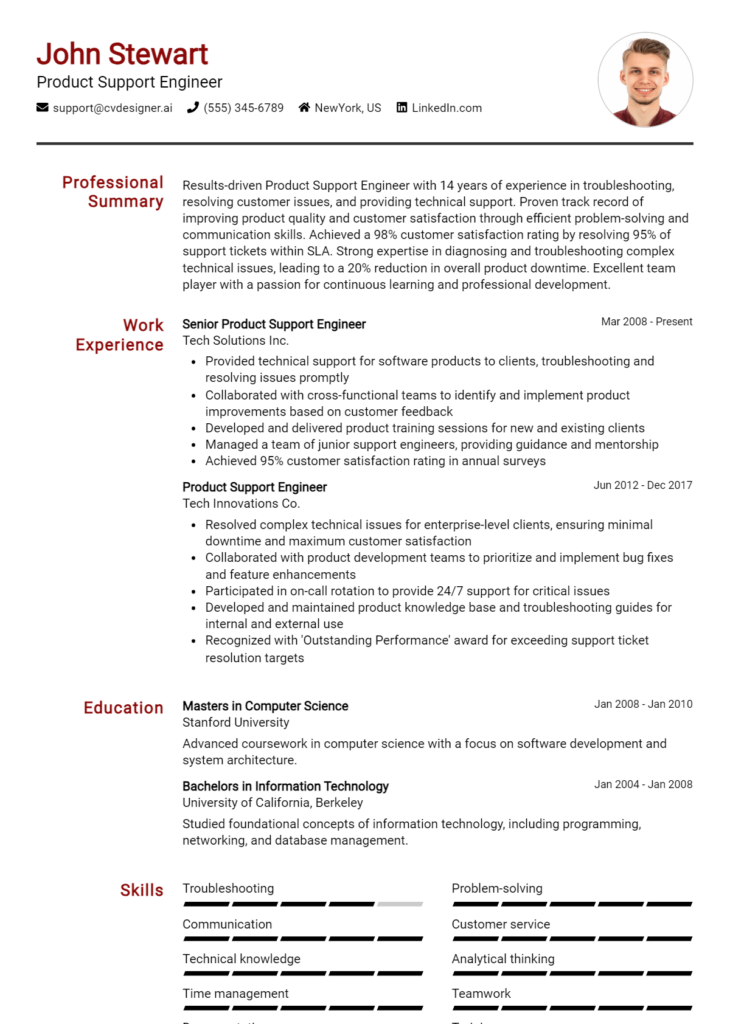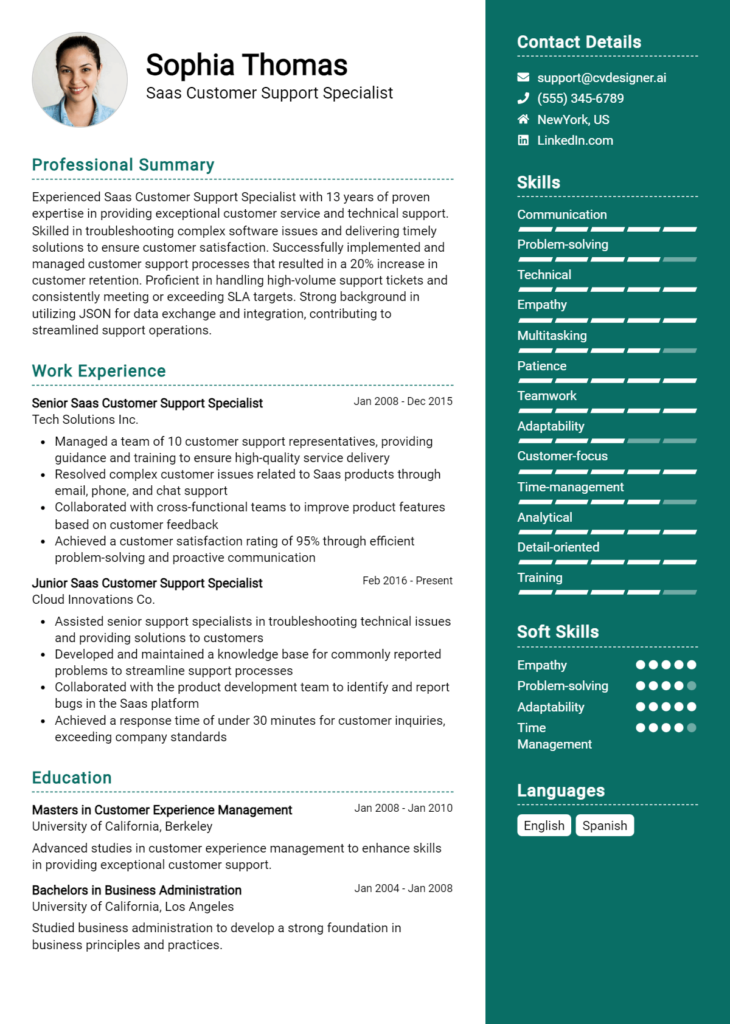Network Support Engineer Core Responsibilities
A Network Support Engineer plays a crucial role in ensuring seamless connectivity across departments by managing and maintaining network infrastructure. This position requires a blend of technical expertise in networking protocols, operational knowledge for system optimization, and strong problem-solving skills to address network issues efficiently. By effectively collaborating with IT, security, and other departments, these engineers contribute to the organization's overall goals. A well-structured resume showcasing these qualifications can significantly enhance career prospects in this field.
Common Responsibilities Listed on Network Support Engineer Resume
- Troubleshooting and resolving network connectivity issues.
- Monitoring network performance and implementing improvements.
- Configuring and maintaining routers, switches, and firewalls.
- Assisting in the design and implementation of network solutions.
- Documenting network configurations and procedures.
- Collaborating with IT teams to support cybersecurity measures.
- Conducting regular network assessments and upgrades.
- Providing technical support and training to end-users.
- Ensuring compliance with network security policies.
- Managing network-related projects and timelines.
- Responding to network outages and service interruptions promptly.
- Staying updated on industry trends and emerging technologies.
High-Level Resume Tips for Network Support Engineer Professionals
In the competitive field of network support engineering, a well-crafted resume serves as your initial handshake with prospective employers. It is often the first impression that determines whether your application moves forward or gets lost in the shuffle. Therefore, your resume must effectively highlight your technical skills, relevant experience, and notable achievements that set you apart from the competition. In this guide, we will provide practical and actionable resume tips specifically tailored for Network Support Engineer professionals, ensuring your application resonates with hiring managers and showcases your qualifications.
Top Resume Tips for Network Support Engineer Professionals
- Tailor your resume for each job application by aligning your skills and experiences with the specific job description.
- Use clear, concise language and technical terminology relevant to network support engineering to demonstrate your expertise.
- Showcase relevant experience, focusing on roles that involved network troubleshooting, system integration, and support.
- Quantify your achievements where possible, such as improving network uptime by a certain percentage or reducing ticket resolution time.
- Highlight industry-specific skills, such as knowledge of network protocols, security measures, and experience with specific hardware and software.
- Include certifications that are recognized in the industry, such as CompTIA Network+, Cisco CCNA, or Juniper JNCIA.
- Utilize a clean and professional format that enhances readability and allows key information to stand out.
- Incorporate keywords from the job posting to optimize your resume for applicant tracking systems (ATS).
- Keep your resume to one page if you have less than 10 years of experience, focusing on the most relevant information.
- Consider adding a summary statement at the top that encapsulates your career goals and technical proficiencies.
By implementing these tips, you can significantly enhance your resume and increase your chances of landing a job in the Network Support Engineer field. A well-structured resume not only showcases your qualifications but also demonstrates your professionalism and attention to detail, making you a more appealing candidate to potential employers.
Why Resume Headlines & Titles are Important for Network Support Engineer
In the competitive field of network support engineering, a well-crafted resume headline or title serves as a crucial first impression for hiring managers. This brief yet powerful phrase encapsulates a candidate's core qualifications, skills, and suitability for the role, making it an essential element of a successful resume. A strong headline not only grabs attention but also provides a snapshot of what the candidate brings to the table, allowing hiring managers to quickly assess their fit for the position. Therefore, it’s vital that the headline is concise, relevant, and directly related to the job being applied for, setting the tone for the rest of the application.
Best Practices for Crafting Resume Headlines for Network Support Engineer
- Keep it concise: Aim for a headline that is brief and to the point, ideally 8-12 words.
- Be role-specific: Tailor the headline to reflect the specific position of Network Support Engineer.
- Highlight key skills: Include important skills relevant to network support, such as troubleshooting or network security.
- Use action words: Start with strong action verbs to convey confidence and proactivity.
- Include certifications: Mention any relevant certifications, such as CCNA or CompTIA Network+, if applicable.
- Reflect experience: Indicate years of experience or notable achievements that set you apart.
- Avoid jargon: Use clear language that can be easily understood by non-technical hiring managers.
- Make it impactful: Ensure the headline creates a sense of urgency or a compelling reason to read further.
Example Resume Headlines for Network Support Engineer
Strong Resume Headlines
"Certified Network Support Engineer with 5+ Years in Troubleshooting & Optimization"
“Experienced Network Support Specialist Skilled in Cisco & Juniper Technologies”
"Proven Network Support Engineer with Expertise in Cybersecurity Solutions"
"Dynamic Network Support Engineer with a Track Record of Reducing Downtime by 30%"
Weak Resume Headlines
“Network Engineer”
“IT Professional Seeking Opportunities”
The strong resume headlines are effective because they convey specific skills, experience, and accomplishments that make the candidate stand out. They provide a clear indication of the candidate's strengths and relevance to the role of a Network Support Engineer. In contrast, the weak headlines fail to impress as they are vague and non-specific, lacking the detail necessary to capture the interest of hiring managers. A generic title does not communicate the candidate's unique value and may lead to their resume being overlooked in a sea of applicants.
Writing an Exceptional Network Support Engineer Resume Summary
A well-crafted resume summary is crucial for a Network Support Engineer as it serves as the first impression to hiring managers. This brief yet impactful section allows candidates to quickly highlight their key skills, relevant experience, and notable accomplishments, effectively capturing the attention of potential employers. A strong summary is concise, tailored to the specific job being applied for, and directly aligns with the requirements outlined in the job description, making it an essential component of a successful resume.
Best Practices for Writing a Network Support Engineer Resume Summary
- Quantify Achievements: Use specific numbers or metrics to showcase your impact, such as the number of networks managed or reductions in downtime.
- Focus on Key Skills: Highlight essential skills such as troubleshooting, network security, and customer support that are pertinent to the role.
- Tailor for the Job Description: Customize your summary to reflect the language and requirements of the job posting to demonstrate alignment.
- Keep it Concise: Aim for 2-4 sentences that encapsulate your experience without overwhelming the reader.
- Showcase Relevant Experience: Briefly mention your years of experience and any specialized knowledge that sets you apart.
- Use Action-Oriented Language: Start with strong action verbs to convey confidence and capability.
- Highlight Certifications: If applicable, mention any relevant certifications (e.g., CCNA, CompTIA Network+) that affirm your expertise.
- Reflect Soft Skills: Include soft skills like communication and teamwork, which are vital in support roles.
Example Network Support Engineer Resume Summaries
Strong Resume Summaries
Detail-oriented Network Support Engineer with over 5 years of experience managing and optimizing enterprise networks. Achieved a 30% reduction in downtime through proactive monitoring and troubleshooting, ensuring seamless connectivity for over 1,000 users.
Dedicated Network Support Engineer with expertise in Cisco and Juniper technologies, successfully implemented network security protocols that reduced breaches by 40%. Proven ability to collaborate with cross-functional teams to enhance system performance.
Proficient Network Support Engineer with a track record of resolving 99% of support tickets within SLA. Spearheaded a project that upgraded network infrastructure, leading to a 25% increase in data transfer rates.
Weak Resume Summaries
Network Support Engineer seeking a position where I can use my skills.
Experienced in network support and troubleshooting with some knowledge of various technologies.
The examples provided highlight the differences between strong and weak resume summaries. Strong summaries effectively quantify achievements and specify relevant skills, demonstrating the candidate's direct impact and expertise in the field. In contrast, weak summaries are vague and lack measurable outcomes, failing to capture the hiring manager's attention or convey the candidate's qualifications effectively.
Work Experience Section for Network Support Engineer Resume
The work experience section of a Network Support Engineer resume is pivotal in illustrating the candidate's technical prowess, leadership capabilities, and commitment to delivering high-quality network solutions. This section not only showcases the skills acquired through hands-on experience but also emphasizes the ability to collaborate with teams and manage complex projects effectively. Quantifying achievements—such as improving network uptime or reducing response times—aligns the candidate's experience with industry standards, making a compelling case for their suitability for the role.
Best Practices for Network Support Engineer Work Experience
- Highlight specific technical skills relevant to network support, such as proficiency in routing protocols, firewalls, or network monitoring tools.
- Quantify achievements with metrics, such as percentage improvements in system performance or reduction in downtime.
- Include examples of leadership where you managed teams or led projects, showcasing your ability to drive results.
- Demonstrate collaboration by mentioning cross-functional team projects and your role in those efforts.
- Use action verbs to convey your contributions clearly and impactfully.
- Tailor your experiences to align with industry standards and job descriptions to maximize relevance.
- Incorporate industry certifications or training that enhance your qualifications in the context of your experiences.
- Keep descriptions concise yet informative, focusing on the most relevant details for the role you are applying for.
Example Work Experiences for Network Support Engineer
Strong Experiences
- Led a team of 5 network engineers in a project that improved network uptime from 95% to 99.9%, significantly enhancing customer satisfaction.
- Implemented a new monitoring system that reduced network response times by 30%, resulting in a 15% decrease in incident tickets.
- Collaborated with cross-functional teams to design and deploy a secure VPN solution that increased remote access capabilities for over 300 employees.
- Upgraded network infrastructure, which resulted in a 40% increase in data transfer rates and a 20% reduction in operational costs.
Weak Experiences
- Worked on network issues and occasionally solved problems.
- Helped with team projects and participated in discussions.
- Involved in network maintenance tasks as needed.
- Assisted in implementing network solutions without specific outcomes mentioned.
The examples listed as strong experiences are considered effective because they clearly articulate specific achievements, quantify outcomes, and demonstrate leadership and collaboration in a way that aligns with the expectations of the role. In contrast, the weak experiences lack measurable results and specificity, making them less impactful and failing to convey the depth of the candidate's contributions or expertise.
Education and Certifications Section for Network Support Engineer Resume
The Education and Certifications section of a Network Support Engineer resume plays a critical role in establishing the candidate's qualifications and suitability for the position. This section not only showcases the applicant's academic background but also highlights industry-relevant certifications and ongoing professional development. By detailing relevant coursework, certifications, and specialized training, candidates can significantly enhance their credibility and demonstrate a commitment to staying current in a rapidly evolving field. This emphasis on education and certification helps potential employers assess the candidate's expertise and alignment with the specific demands of the job role.
Best Practices for Network Support Engineer Education and Certifications
- Include only relevant degrees and certifications that pertain to network support and engineering.
- List certifications in order of relevance and importance, prioritizing industry-standard credentials.
- Provide specific coursework that directly relates to network technologies, protocols, and troubleshooting.
- Highlight advanced certifications such as CCNP, CCIE, or CompTIA Network+ to showcase expertise.
- Include the date of certification renewal to demonstrate ongoing professional development.
- Use clear and concise language to outline educational achievements and certifications.
- Consider including honors or relevant projects completed during your studies that underscore practical skills.
- Organize the section in a way that is easy to read, using bullet points for clarity.
Example Education and Certifications for Network Support Engineer
Strong Examples
- Bachelor of Science in Computer Networking, XYZ University, 2021
- Cisco Certified Network Professional (CCNP), 2023
- CompTIA Network+ Certification, 2022
- Relevant Coursework: Network Security, Routing and Switching, IP Addressing and Subnetting
Weak Examples
- Bachelor of Arts in English Literature, ABC College, 1999
- Old Microsoft Certified Systems Engineer (MCSE), obtained in 2005
- Certification in Basic Computer Skills, 2020
- Relevant Coursework: Introduction to Psychology
The strong examples are considered relevant as they directly align with the skills and knowledge required for a Network Support Engineer role, showcasing both recent education and industry-recognized certifications. In contrast, the weak examples are less effective due to their irrelevance to network engineering, outdated certifications, or degrees that do not pertain to the technical field, failing to demonstrate the candidate's qualifications for the role.
Top Skills & Keywords for Network Support Engineer Resume
In the competitive field of network engineering, having the right blend of skills is essential for crafting a standout resume. A Network Support Engineer must not only demonstrate technical prowess but also showcase interpersonal abilities that facilitate collaboration and problem-solving. Highlighting both hard and soft skills can significantly enhance your resume, making it more appealing to potential employers. By focusing on key competencies, job seekers can effectively communicate their qualifications and readiness for the challenges of the role, leading to better opportunities in a dynamic work environment.
Top Hard & Soft Skills for Network Support Engineer
Soft Skills
- Excellent Communication Skills
- Problem-Solving Abilities
- Team Collaboration
- Adaptability
- Time Management
- Customer Service Orientation
- Attention to Detail
- Critical Thinking
- Conflict Resolution
- Analytical Skills
- Creativity
- Initiative
- Empathy
- Interpersonal Skills
- Stress Management
- Decision-Making Skills
Hard Skills
- Proficiency in Networking Protocols (TCP/IP, DNS, DHCP)
- Experience with Network Security (Firewalls, VPNs)
- Knowledge of Network Configuration and Troubleshooting
- Familiarity with Network Monitoring Tools (Wireshark, SolarWinds)
- Understanding of Cloud Networking (AWS, Azure)
- Skills in Routing and Switching (Cisco, Juniper)
- Experience with Virtualization Technologies (VMware, Hyper-V)
- Knowledge of Wireless Networking (802.11 standards)
- Proficiency in Scripting Languages (Python, Bash)
- Familiarity with ITIL Framework
- Experience with Network Management Software
- Understanding of Network Architecture Design
- Knowledge of VoIP Technologies
- Skills in Backup and Disaster Recovery Solutions
- Proficiency in Cisco or CompTIA Certifications
- Understanding of IPv4 and IPv6
- Experience with Load Balancers and Proxy Servers
By integrating both skills and work experience into your resume, you can create a compelling narrative that highlights your unique qualifications and positions you as a strong candidate for a Network Support Engineer role.
Stand Out with a Winning Network Support Engineer Cover Letter
I am writing to express my interest in the Network Support Engineer position at [Company Name] as advertised on [Job Board/Company Website]. With a solid background in network management and troubleshooting, combined with my commitment to maintaining efficient and secure network operations, I am excited about the opportunity to contribute to your esteemed team. My hands-on experience with various networking technologies, along with my problem-solving skills, positions me as a strong candidate for this role.
In my previous role at [Previous Company Name], I was responsible for supporting a diverse range of network systems and ensuring optimal performance. I successfully resolved complex network issues, reducing downtime by 30% through effective troubleshooting and proactive system monitoring. My expertise in configuring and maintaining routers, switches, and firewalls has equipped me with the knowledge to identify potential vulnerabilities and implement necessary security measures. Additionally, I have experience with network documentation and user training, which has fostered a collaborative environment among team members and end-users alike.
I am particularly drawn to [Company Name] because of its commitment to innovation and excellence in the field of networking. I am eager to bring my technical skills and customer-focused approach to your team, ensuring seamless network performance and user satisfaction. The opportunity to work with cutting-edge technology and contribute to large-scale projects aligns perfectly with my career goals and aspirations. I am confident that my proactive attitude and technical acumen will make a positive impact at [Company Name].
Thank you for considering my application. I look forward to the opportunity to discuss how my background, skills, and enthusiasms align with the goals of your network support team. I am excited about the possibility of contributing to [Company Name] and am eager to bring my expertise in network support to your organization.
Common Mistakes to Avoid in a Network Support Engineer Resume
A well-crafted resume is crucial for any Network Support Engineer looking to make a strong impression on potential employers. However, many candidates fall into common pitfalls that can undermine their qualifications and experience. Avoiding these mistakes can significantly enhance your chances of landing an interview. Here are some common errors to steer clear of when creating your Network Support Engineer resume:
Vague Job Descriptions: Failing to provide specific details about your previous roles can leave hiring managers confused about your responsibilities and accomplishments. Be sure to quantify your achievements and outline your exact duties.
Using Technical Jargon Excessively: While it's important to showcase your technical skills, overloading your resume with jargon can alienate HR personnel who may not have a technical background. Strike a balance by using clear language that conveys your expertise.
Neglecting Soft Skills: Many candidates focus solely on technical abilities and overlook the importance of soft skills such as communication, teamwork, and problem-solving. Highlighting these qualities can show your ability to work effectively in a team environment.
Ignoring Formatting and Readability: A cluttered or overly complex resume can be hard to read and may deter recruiters. Use bullet points, headings, and consistent formatting to ensure your resume is visually appealing and easy to navigate.
Listing Irrelevant Experience: Including unrelated work experience can dilute the impact of your resume. Tailor your document to focus on relevant positions and skills that directly relate to network support engineering.
Failing to Customize for Each Job Application: Sending out a generic resume can make you appear uninterested in the specific position. Customize your resume for each application by highlighting the skills and experiences that align with the job description.
Not Including Certifications: In the tech industry, certifications can significantly bolster your credibility. Make sure to list relevant certifications, such as CompTIA Network+, Cisco CCNA, or others that demonstrate your qualifications.
Overlooking Keywords from the Job Description: Many companies use applicant tracking systems (ATS) to filter resumes. Failing to incorporate relevant keywords from the job description can result in your resume being overlooked. Analyze the job posting and include pertinent terms in your resume.
Conclusion
As a Network Support Engineer, you play a crucial role in maintaining and optimizing network systems, ensuring seamless connectivity and performance. This article has outlined the essential skills and responsibilities associated with this role, including troubleshooting network issues, implementing security measures, and collaborating with IT teams to enhance overall network functionality.
In addition to technical expertise, effective communication and problem-solving skills are vital for success in this position. Staying updated with the latest networking technologies and best practices can significantly boost your career prospects and effectiveness in your role.
To ensure you present yourself as a strong candidate for Network Support Engineer positions, it’s important to regularly review and update your resume. Tailor your resume to highlight relevant experience, skills, and achievements that align with the job requirements.
To assist you in this process, consider utilizing tools such as resume templates, which provide a polished framework for your resume, or the resume builder to create a customized document easily. You can also explore resume examples to gain inspiration from successful professionals in your field. Lastly, don’t forget the importance of a well-crafted cover letter; check out the cover letter templates available to enhance your application package.
Take action now to refine your resume and increase your chances of landing that desired Network Support Engineer position!

